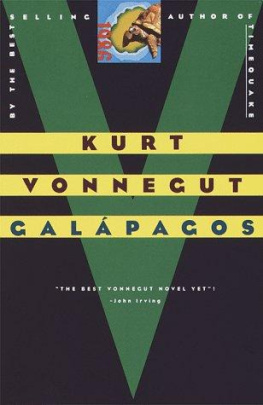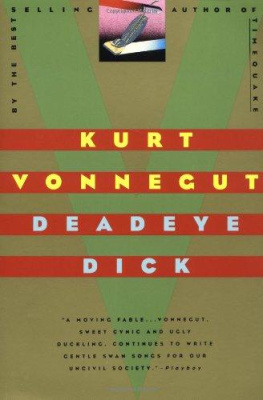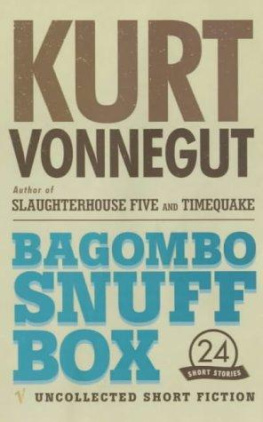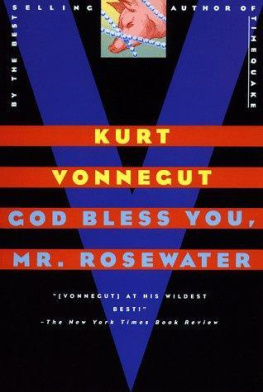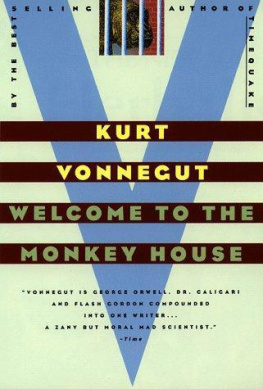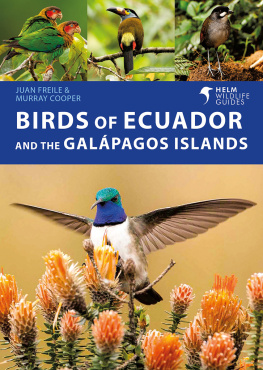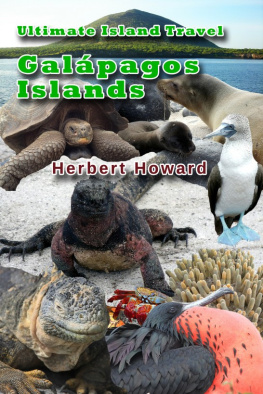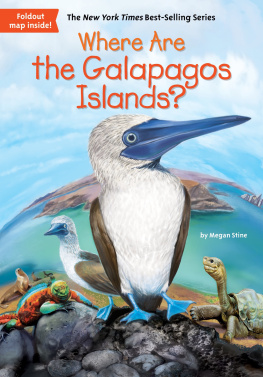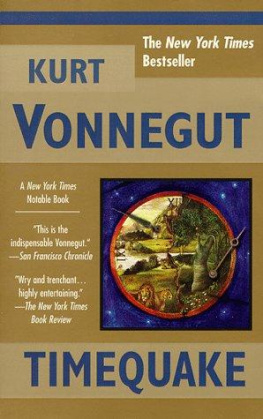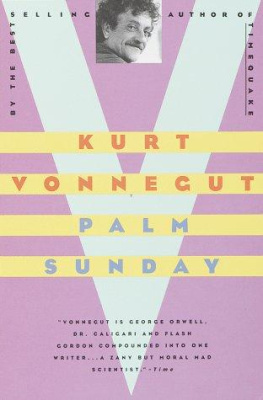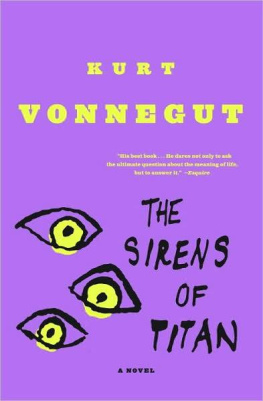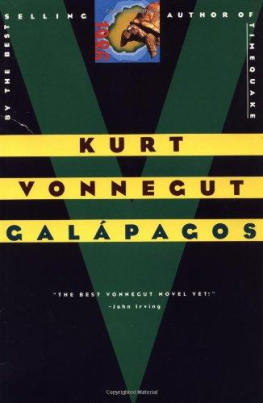AMERICAs GREATEST SATIRIST
KURT VONNEGUT IS UNIQUE one of the writers who map our landscapes for us, who give names to the places we know best. DORIS LESSING,
The New York Times Book Review OUR FINEST BLACK-HUMORIST.
We laugh in self-defense. The Atlantic Monthly AN UNIMITATIVE AND INIMITABLE
SOCIAL SATIRIST. Harpers Magazine A MEDICINE MAN, CONJURING UP
FANTASIES TO WARN THE WORLD. The Charlotte Observer VONNEGUT IS GEORGE ORWELL,
DR. CALIGARI, AND FLASH GORDON
COMPOUNDED IN ONE WRITER
A ZANY BUT MORAL MAD SCIENTIST. Time A CAUSE FOR CELEBRATION. Chicago Sun-Times A LAUGHING PROPHET OF DOOM. The New York Times A SATIRE IN THE CLASSIC TRADITION
A DARK VISION, A HEARTFELT WARNING. The Detroit Free Press Interesting, engaging, sad and yet very funny Vonnegut is still in top form. If he has no prescription for alleviating the pain of the human condition, at least he is a first-rate diagnostician. SUSAN ISAACS
Newsday Dark original and funny. People A triumph of style, originality and warped yet consistent logic a condensation, an evolution of Vonneguts entire career, including all the issues and questions he has pursued relentlessly for four decades. The Philadelphia Inquirer Wild details, wry humor, outrageous characters Galpagos is a comic lament, a sadly ironic vision. St. Louis Post-Dispatch A WORK OF HIGH COMEDY, SADNESS AND IMAGINATION. The Denver Post Wacky wit and irreverent imagination and the full range of technical innovations have made [Vonnegut] Americas preeminent experimental novelist. The Minneapolis Star and Tribune Beneath the droll humor, some scathing perceptions about 20th-century ills. We need writers like Vonnegutserving as universal consciencesto remind us, as were chuckling, about the darker side of our existence. The Sacramento Bee A superbly crafted, insightful, witty yet tragic appraisal of where we are as a race and where we might be better off. UPI
BY KURT VONNEGUT A Man Without a Country Armageddon in Retrospect Bagombo Snuff Box Between Time and Timbuktu Bluebeard Breakfast of Champions Canary in a Cat House Cats Cradle Deadeye Dick Fates Worse Than Death Galpagos God Bless You, Dr. Kevorkian God Bless You, Mr. Rosewater Happy Birthday, Wanda June Hocus Pocus Jailbird Like Shaking Hands with God ( with Lee Stringer) Mother Night Palm Sunday Player Piano The Sirens of Titan Slapstick Slaughterhouse-Five Timequake Wampeters, Foma & Granfalloons Welcome to the Monkey House

In memory of Hillis L. Howie ,
(19031982) amateur naturalist
A good man who
took me and my best friend Ben Hitz
and some other boys
out to the American Wild West
from Indianapolis, Indiana ,
in the summer of 1938 .
Mr. Howie introduced us to real Indians
and had us sleep out of doors every night
and bury our dung ,
and he taught us how to ride horses ,
and he told us the names of many plants
and animals ,
and what they needed to do
in order to stay alive
and reproduce themselves .
One night Mr. Howie scared us half to death
on purpose ,
screaming like a wildcat near our camp .
A real wildcat screamed back .
In spite of everything, I still believe people are really good at heart . ANNE FRANK (19291944)
BOOK ONE
THE THING WAS
T HE THING WAS :
One million years ago, back in 1986 A.D., Guayaquil was the chief seaport of the little South American democracy of Ecuador, whose capital was Quito, high in the Andes Mountains. Guayaquil was two degrees south of the equator, the imaginary bellyband of the planet after which the country itself was named. It was always very hot there, and humid, too, for the city was built in the doldrumson a springy marsh through which the mingled waters of several rivers draining the mountains flowed.
This seaport was several kilometers from the open sea. Rafts of vegetable matter often clogged the soupy waters, engulfing pilings and anchor lines.

Human beings had much bigger brains back then than they do today, and so they could be beguiled by mysteries. One such mystery in 1986 was how so many creatures which could not swim great distances had reached the Galpagos Islands, an archipelago of volcanic peaks due west of Guayaquilseparated from the mainland by one thousand kilometers of very deep water, very cold water fresh from the Antarctic. When human beings discovered those islands, there were already geckos and iguanas and rice rats and lava lizards and spiders and ants and beetles and grasshoppers and mites and ticks in residence, not to mention enormous land tortoises.
What form of transportation had they used?
Many people were able to satisfy their big brains with this answer: They came on natural rafts.

Other people argued that such rafts became waterlogged and rotted to pieces so quickly that nobody had ever seen one out of sight of land, and that the current between the islands and the mainland would carry any such rustic vessel northward rather than westward.
Or they asserted that all those landlubberly creatures had walked dry-shod across a natural bridge or had swum short distances between stepping-stones, and that one such formation or another had since disappeared beneath the waves. But scientists using their big brains and cunning instruments had by 1986 made maps of the ocean floor. There wasnt a trace, they said, of an intervening land mass of any kind.

Other people back in that era of big brains and fancy thinking asserted that the islands had once been part of the mainland, and had been split off by some stupendous catastrophe.
But the islands didnt look as though they had been split off from anything. They were clearly young volcanoes, which had been vomited up right where they were. Many of them were such newborns out there that they could be expected to blow again at any time. Back in 1986, they hadnt even sprouted much coral yet, and so were without blue lagoons and white beaches, amenities many human beings used to regard as foretastes of an ideal afterlife.
A million years later, they do possess white beaches and blue lagoons. But when this story begins, they were still ugly humps and domes and cones and spires of lava, brittle and abrasive, whose cracks and pits and bowls and valleys brimmed over not with rich topsoil or sweet water, but with the finest, driest volcanic ash.

Another theory back then was that God Almighty had created all those creatures where the explorers found them, so they had had no need for transportation.

Another theory was that they had been shooed ashore there two by twodown the gangplank of Noahs ark.
If there really was a Noahs ark, and there may have beenI might entitle my story A Second Noahs Ark.
T HERE WAS NO MYSTERY a million years ago as to how a thirty-five-year-old American male named James Wait, who could not swim a stroke, intended to get from the South American continent to the Galpagos Islands. He certainly wasnt going to squat on a natural raft of vegetable matter and hope for the best. He had just bought a ticket at his hotel in downtown Guayaquil for a two-week cruise on what was to be the maiden voyage of a new passenger ship called the Baha de Darwin , Spanish for Darwin Bay. This first Galpagos trip for the ship, which flew the Ecuadorian flag, had been publicized and advertised all over the world during the past year as the Nature Cruise of the Century.

